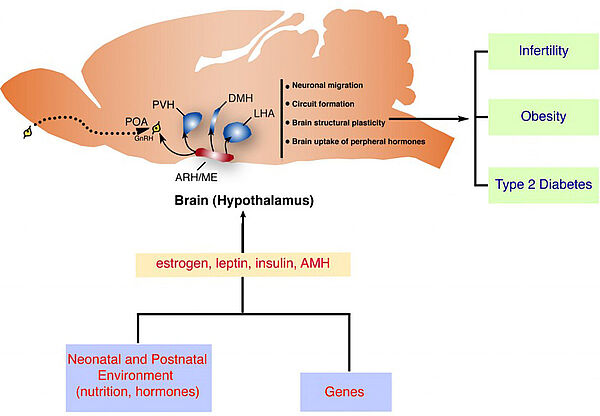Structuring projects
Interactions between hypothalamic neuroendocrine systems and peripheral hormones are increasingly thought to play a fundamental role in postnatal brain development, the impairment of which lies at the origin of several major neurological and psychiatric disorders. In addition, over the last few years, evidence has been accumulating for the involvement of central neurohormone imbalances in both the pathophysiology of cognitive disorders, such as certain early-onset dementias, and in the pathophysiology of metabolic and reproductive disorders such as obesity and infertility. Our laboratory examines how chemotropic factors and peripheral hormones (estrogen, leptin, AMH…) impact hypothalamic development and function, as well as the importance of non-neuronal cells (tanycytes, astrocytes and endothelial cells) in this dialogue between the periphery and the central nervous system.
It also aims to evaluate how pathological conditions (obesity, diabetes etc.) affect these neurobiological events and, conversely, how the impairment of communication between the brain and the periphery renders the organism prone to developing such conditions (obesity, diabetes, precocious and/or delayed puberty and infertility). Our laboratory brings together in a single setting a wide range of theoretical knowledge and technical expertise in its fields of research and is able to investigate physiological and pathological processes from the molecular and genetic/epigenetic levels to that of human patients, thanks to the close interaction between basic scientists and clinicians. For the excellence of our work, our laboratory has been classified as “remarkable” (the highest “grade” attributed to French research laboratories) by our evaluating bodies in 2014 and 2019.


